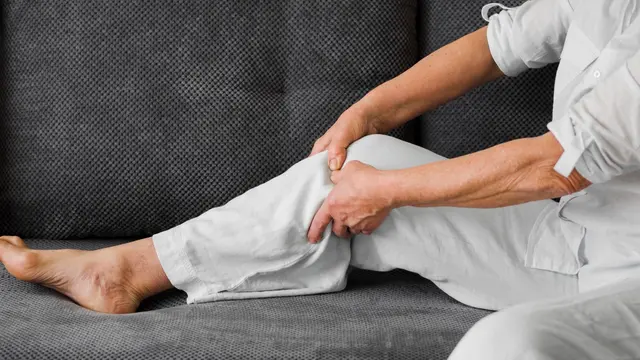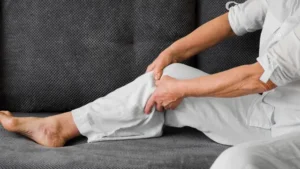

Do you ever find yourself jolted awake in the middle of the night by a sudden, excruciating pain in your legs? You’re not alone. Nighttime leg cramps can strike anyone, disrupting your precious sleep and leaving you desperate for relief. In this blog post, we’ll explore the causes of these pesky cramps and share effective tips on how to quickly treat them so you can finally get a good night’s rest. Let’s dive in!
What are Nighttime Leg Cramps?
Nighttime leg cramps are involuntary muscle contractions that occur in the legs during sleep. These cramps often strike suddenly, causing intense pain and discomfort, which can range from mild to severe. The most common muscles affected by nighttime leg cramps are the calf muscles, although they can also occur in the thighs or feet.
The exact cause of nighttime leg cramps is not always clear, but dehydration, muscle fatigue, poor circulation, and mineral deficiencies are believed to play a role. Certain medical conditions such as diabetes or peripheral artery disease may also increase the risk of experiencing these painful cramps.
While occasional nighttime leg cramps may be harmless and resolve on their own, frequent or severe episodes can significantly impact your quality of sleep and overall well-being. Understanding the triggers and learning how to manage these cramps effectively is crucial for finding relief and enjoying uninterrupted rest at night.
Common Causes of Nighttime Leg Cramps
Have you ever been jolted awake in the middle of the night by a sudden, sharp pain in your leg? Nighttime leg cramps can be incredibly disruptive to your sleep and leave you wondering what could have caused this uncomfortable sensation. One common cause of nighttime leg cramps is dehydration. Not getting enough fluids during the day can lead to muscle spasms and cramping, especially at night when your body is more prone to dehydration.
Another culprit for these pesky cramps can be overexertion or muscle fatigue. Engaging in strenuous physical activity without proper stretching or conditioning can strain muscles and trigger nighttime leg cramps. Electrolyte imbalances, such as low levels of potassium, magnesium, or calcium, may also contribute to nocturnal leg cramps. These essential minerals play a crucial role in muscle function and their deficiency can result in painful cramping episodes during the night.
Certain medications or underlying health conditions like diabetes or peripheral artery disease could also be responsible for those unwelcome midnight charley horses. It’s important to consult with a healthcare professional if you experience frequent or severe nighttime leg cramps to identify the root cause and find appropriate treatment options.
How to Prevent Nighttime Leg Cramps
Nighttime leg cramps can be a real sleep disruptor, but there are steps you can take to help prevent them from happening. One key aspect is staying hydrated throughout the day. Dehydration can contribute to muscle cramps, so make sure you’re drinking enough water daily.
Stretching your muscles regularly, especially before bedtime, can also help prevent nighttime leg cramps. Focus on stretching the calf muscles and thighs to keep them flexible and less prone to cramping during the night. Additionally, incorporating potassium-rich foods like bananas, sweet potatoes, and leafy greens into your diet may help since low levels of potassium can trigger muscle cramps.
Maintaining a regular exercise routine that includes both cardiovascular activities and strength training can improve circulation and muscle function, reducing the likelihood of experiencing leg cramps at night. Ensure you have proper footwear that provides adequate support for your feet to avoid straining your leg muscles unnecessarily while walking or exercising during the day.
Effective Treatment Options for Nighttime Leg Cramps
If you find yourself waking up in the middle of the night with a painful leg cramp, rest assured that there are effective treatment options available to help alleviate your discomfort. One common method is stretching the affected muscle gently to relieve the spasm. You can do this by pulling your toes towards you until you feel relief.
Another quick remedy is applying heat to the cramped muscle, which can help relax it and ease the pain. A warm bath or using a heating pad on the area may provide some relief. Massaging the cramped muscle can also help increase blood flow and loosen tightness, reducing cramping. In some cases, over-the-counter pain relievers like ibuprofen or acetaminophen may be helpful in managing nighttime leg cramps. Make sure to follow recommended dosages and consult with a healthcare provider if needed for guidance on medication usage for your specific situation.
Lifestyle Changes to Reduce the Frequency of Nighttime Leg Cramps
If you’re tired of being awakened by the discomfort of nighttime leg cramps, making some lifestyle changes might help reduce their frequency. One simple adjustment is to ensure you stay hydrated throughout the day. Dehydration can contribute to muscle cramping, so drink plenty of water. Another lifestyle change that could benefit your legs is regular stretching. Incorporating gentle stretches before bedtime or even during the day can help prevent muscles from tightening up and causing cramps at night.
Maintaining a balanced diet rich in potassium, magnesium, and calcium may also aid in reducing the occurrence of leg cramps. These essential minerals play a crucial role in muscle function and contraction. Additionally, avoiding sitting or standing for prolonged periods can help improve circulation and prevent cramps from developing. Remember to listen to your body’s signals and take breaks when needed. By implementing these lifestyle changes into your daily routine, you may find relief from nighttime leg cramps and enjoy more restful sleep.
When to Seek Medical Attention
If you find that your nighttime leg cramps are persistent and not improving with self-care measures, it may be time to consult a healthcare professional. Severe and frequent leg cramps could indicate an underlying medical condition that needs attention. Additionally, if the cramps are accompanied by swelling, redness, warmth in the affected area, or any unusual symptoms like numbness or tingling sensation, it’s crucial to seek medical advice promptly. These signs could signal something more serious than just a typical muscle cramp.
Moreover, if the leg cramps interfere significantly with your quality of sleep or daily activities despite trying various treatment methods, it’s wise to get evaluated by a healthcare provider. They can help determine the root cause of your nighttime leg cramps and recommend appropriate interventions tailored to your specific situation. Remember that seeking timely medical assistance is essential for proper diagnosis and management of any potential underlying issues contributing to your nighttime leg cramps.
Conclusion
Nighttime leg cramps can be a bothersome and disruptive issue, affecting many individuals during their sleep. By understanding the common causes and implementing preventive measures, such as staying hydrated, stretching regularly, and maintaining proper nutrition, you can significantly reduce the frequency of nighttime leg cramps. In cases where these preventive strategies are not sufficient to alleviate the cramps, there are various treatment options available. From simple home remedies like applying heat or cold packs to more advanced treatments like prescription medications or physical therapy, finding what works best for you is key.







